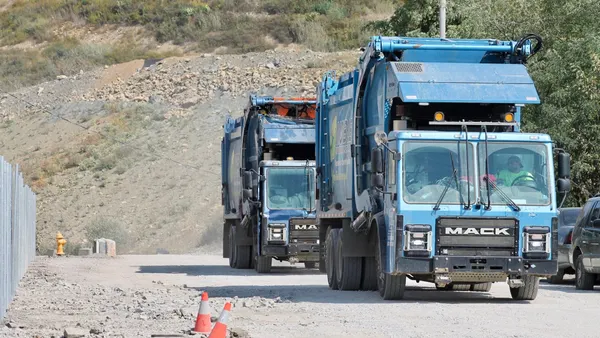Dive Brief:
- Waste management companies are refusing to haul medical waste contaminated with the Ebola virus.
- Hospitals in the U.S. are having a difficult time finding companies that will agree to handle solid sheets and protective gear that has come into contact with patients who contracted Ebola.
- Federal guidelines ensure hazardous waste contaminated with Ebola is handled in special packaging by handlers with hazardous materials training. Thomas Metzger, the communication director for the National Waste & Recycling Association (NW&RA), said that Waste Management contractors assume they can’t legally handle waste with the infectious virus.
Dive Insight:
Two missionaries evacuated form West Africa who tested positive with the virus were being treated at Emory University Hospital in Atlanta, GA. Bags of waste piled up at the hospital as it generated around 40 bags of waste per day while treating Ebola patients at the peak of the illness. Hospital staff acquired 32 gallon containers from a local home improvement retailer to store the waste.
The hazardous waste was stored in a special area of the hospital for six days while the U.S. Center for Disease Control and Prevention (CDC) negotiated a deal with Stericycle, a biohazard waste disposal service that initially refused to handle waste used in the treatment of the patients.
Officials warn that the waste management system currently in place is ill-prepared to deal with issues such as an Ebola outbreak. Some experts fear it is only a matter of time before people walk into emergency rooms in the U.S. with the virus.
The CDC advises hospitals to out the contaminated waste into leak-proof containers and discard of it as they would any biohazard considered “regulated medical waste.” But at the same time, U.S. Department of Transportation (DOT) guidelines stipulate that items in the “regulated medical waste” category can’t be in a form that can cause human harm.
Ebola is classified as a Category A agent, or one that is potentially life-threatening, by DOT, which regulates the transportation of infectious waste. The CDC continues to view its disposal guidelines as appropriate, even when dealing with Ebola-contaminated materials.
Joe Delcambre, a spokesperson for DOT’s Pipeline and Hazardous Materials Safety Administration, would not confirm if there was a move under consideration to require hospitals to sterilize the Ebola waste first, or if that action would lead to a resolution for waste haulers.









